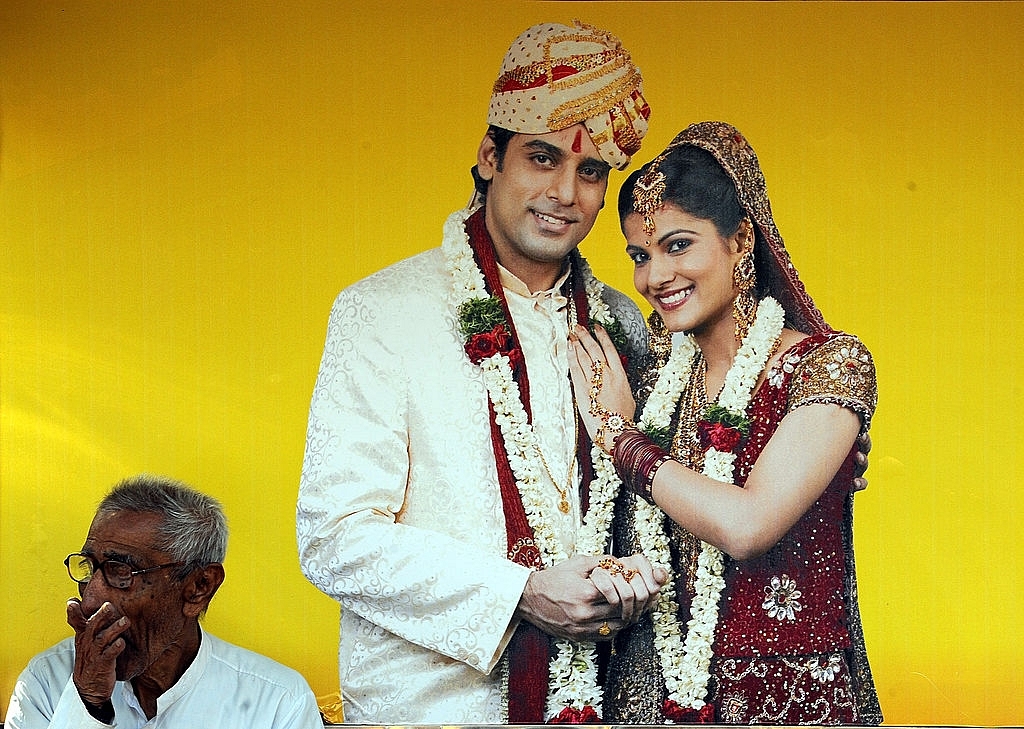Ideas
Marriage In The Era Of ‘Swiping Right’
- How is the digital age and modern consumerism affecting the institution of marriage?

(INDRANIL MUKHERJEE/AFP/Getty Images)
Marriage binds human relations in perhaps the most intimate manner possible, and it has survived as an institution of society across ages because humans find deep emotional security in such a relationship.
That's the reason that marriage has risen as a very strong institution of human society. But, that does not mean that it can't crash, or deform, in the wake of today's' individualism. In fact, marriage does face a threat today but it's not because it has become obsolete but because the concept of modern love is making the institution look less compatible in light of contemporary social behavior.
Relationship of Romanticism and Marriage
Stephanie Coontz, an American historian, in her book (Marriage, a History: How Love Conquered Marriage) informs that marriage was first meant to establish order in society. The idea of marriage gave birth to different social relationships that never existed before. With the relationships coming into being, the practice of transferring property rights from father to his children got cultivated. Briefly, the institution of marriage, over the years, developed into a centrifugal force around which the ancient human societies found their existence.
On the same terrain, Alain de Botton maintains that "tie-up of marriage with romanticism is not a very old phenomenon; since the Romantic Movement (mid-eighteenth century), love became a desirable element in marriage". However, the primary objective of marriage remained always a conjugal arrangement for attaining certain social status and continuing with the family legacy.
Romanticism is quintessentially an affair of emotion. It's rationally right not to find too much of rational in romanticism. You find love charming only when you don't see it through a prism of deep rationalism. If you try to rationalize it; that means love will lose its real essence. Any attempt to treat emotion through a device of reasoning would create only chaos.
On the other hand, people saw rational in being in marriage; a committed relationship of physical and mental security where the engaged partners would surrender themselves with emotional investment for bringing joy to each other's life. So, romantic love provides strong supporting limbs to the body of marriage. But, of late, there have been structural transformations in romantic love.
The body is now a commodity. Products- and services-based enterprises (especially fashion, cosmetic, clothing) venerate the body because the more people value it, the more these production houses will earn, survive and thrive.
One of the main striking, transformative changes in romantic behaviour in modern times is that choices for pairing are made via technology tools. Modern dating sites behave like a virtual supermarket. Famous sociologist, Eva Illouz (author of Why Love Hurts), in an interview with the UK Guardian, calls it a commercial activity of comparing alternatives and frequently asking for a better deal than following a gut feeling in finding a partner.
On just a few clicks, you're free to choose a partner from a borderless territory. The plethora of choices makes the partner seeker utterly confused and indecisive. To reduce his indecisive state of mind, Like a project management program, he comes up with the idea of using checklist of qualities which his prospective wife should have. Despite having such a wide range of options, it's rare that someone finds an ideal partner as per his or her checklist. It's because no sane man or woman with human character can fully fit into a frame from where a person can fulfil the unrealistic expectations of their partner.
Finally, we end up becoming someone who selects his partner on the simplest and the most popular criteria: the external appearance. Those who look charming to look at are considered a safe option to go along with by neglecting other qualities of mutual compatibility. It is as if we're not looking for a soulmate but a sex-mate.
We've become consumers of a love which corrodes the notion of romanticism. Although the concept of love has gone through transformative changes, nevertheless, the institution of marriage remains a preferred choice for living life for a majority of societies across the world. Because only marriage can guarantee a strong family bonding which is undeniably important for emotional, social and economic security in life.
Introducing ElectionsHQ + 50 Ground Reports Project
The 2024 elections might seem easy to guess, but there are some important questions that shouldn't be missed.
Do freebies still sway voters? Do people prioritise infrastructure when voting? How will Punjab vote?
The answers to these questions provide great insights into where we, as a country, are headed in the years to come.
Swarajya is starting a project with an aim to do 50 solid ground stories and a smart commentary service on WhatsApp, a one-of-a-kind. We'd love your support during this election season.
Click below to contribute.
Latest